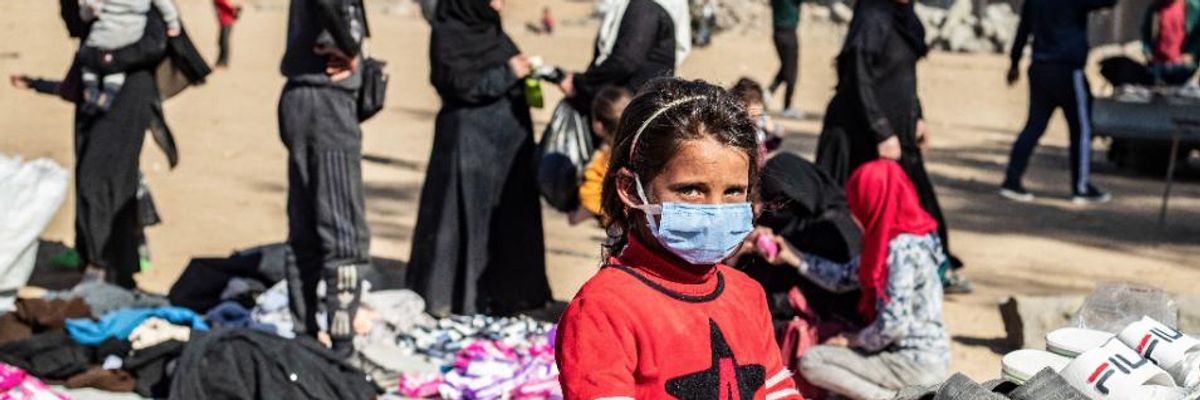On the eve of the world marking one year since the coronavirus outbreak was officially declared a pandemic, humanitarians and global justice campaigners are calling out rich countries for hoarding vaccines--including with a new analysis revealing that excess doses secured by the United States, United Kingdom, and European Union could inoculate all adults in 20 nations facing the worst humanitarian crises.
"Despite these severe vulnerabilities, crisis-affected populations are last in line for the Covid-19 vaccine."
--David Miliband, IRC
The U.S., U.K., and E.U. "have each pre-purchased enough approved Covid-19 doses to vaccinate their populations more than twice over," according to the International Rescue Committee. "These excess doses could vaccinate people aged 16 and over of all 20 of IRC's 2021 Emergency Watchlist countries."
The latest annual Emergency Watchlist, released in December, identified 20 humanitarian crises around the world that IRC expected to deteriorate the most in the next year.
"These countries--from Yemen and Syria to Ethiopia and the Democratic Republic of Congo--face a triple threat of Covid-19, conflict, and climate change, and are home to 85% of people in need of humanitarian aid and international support," the group said Wednesday, urging rich nations to share surplus doses.
Despite the urgent need in watchlist nations, they are expected to receive less than 5% of the COVAX vaccine supply during the first half of 2021. COVAX is a global vaccine initiative led by the World Health Organization and other partners that aims to help inoculate people in developing countries.
"As the pandemic continues to claim lives and destroy livelihoods worldwide, with variants now arising in several countries, the wealthiest countries have continued purchasing enough doses to cover their entire populations several times over--highlighting and exacerbating the extreme inequality faced by people living in conflict and crisis," declared IRC president and CEO David Miliband.
"These countries have already suffered devastating secondary impacts of the Covid-19 pandemic, seeing unprecedented levels of food insecurity and even famine conditions, overwhelmed health facilities, and growing levels of violence against women," he continued. "Despite these severe vulnerabilities, crisis-affected populations are last in line for the Covid-19 vaccine."
Miliband argued that "vaccinating people living in conflict is not just the right thing to do; it is the smart thing to do--and a true test of the multilateral system."
While welcoming announcements that the U.S. and U.K. governments as well as some E.U. member states plan to share surplus doses, the IRC leader emphasized that "more needs to be done--especially as these same countries stockpile enough vaccines individually to cover entire populations of crisis-affected states."
"It is time for wealthy governments to realize that Covid will not be beaten anywhere until it is beaten everywhere--especially as new variants continue to arise, imperiling the efficacy of these same long-awaited vaccines," he concluded. "Now is the time for bold action: commit to share excess vaccine doses and to provide the financial support needed to help low-income countries actually distribute the doses once received--or risk pushing the end of this pandemic even further out of sight."
The IRC analysis came as U.S. President Joe Biden planned to announce Wednesday that he is directing the Department of Health and Human Services to secure 100 million more doses of the vaccine developed by Johnson & Johnson. Unlike the other two vaccines authorized for use in the United States, that one only requires a single shot.
Although the president has been praised for not only ramping up inoculation efforts across the United States but also recommitting to WHO and joining COVAX, activists and experts argue that, as Peter Maybarduk of Public Citizen put it, "Biden should use his power under existing law to accelerate global vaccine manufacturing--including by sharing the vaccine recipe with qualified manufacturers around the world."
Justice campaigners who have accused the Global North of "vaccine apartheid" during the pandemic are advocating for an emergency waiver of the World Trade Organization's Agreement on Trade-Related Aspects of Intellectual Property Rights (TRIPS), which would boost manufacturing by suspending Big Pharma's control over vaccine knowledge and technology. Activists with Doctors Without Borders made that demand outside the WTO headquarters at a protest last week.
Despite global pressure--and new polls that show over two-thirds of Americans and Britons support sharing vaccine know-how and tech with qualified manufacturers--a small group of powerful countries led by the U.S., U.K., and Canada has prevented such a waiver. The TRIPS Council kicked off a two-day Covid-19 meeting on Wednesday.
Campaigners and other critics of unequal vaccine access have taken aim at not only wealthy nations but also the pharmaceutical industry. The People's Vaccine Alliance--a coalition that includes Global Justice Now, UNAIDS, Oxfam, Amnesty International, and ActionAid--organized a Wednesday rally joined by key figures from the U.S., U.K, South Africa, Indonesia, Colombia, and the United Nations.
U.S. participants included Sen. Bernie Sanders (I-Vt.), who tweeted Wednesday that he was "proud to join the global call for a People's Vaccine" and that "the United States must play a leading role in making sure a coronavirus vaccine is available to all people around the world."

